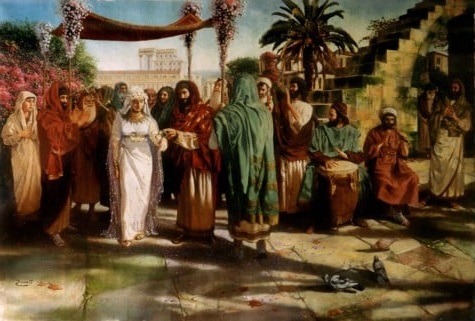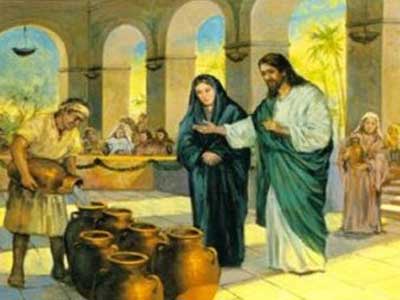Readings: Amos 9:11–15 | Romans 12:6–16 | John 2:1–11
Text: John 2:1-11
Today, we’ll start with the end of the lesson: “This, the first of his signs, Jesus did at Cana in Galilee, and manifested his glory. And his disciples believed in him.”
The Wedding at Cana is not primarily about marriage, or whether drinking wine is right or wrong, or being saved from awkward social situations, any more than pop holiday music captures the true significance of Christmas. Yes, there may be trees and holly, crackling fires and joyful reunions. But these ancillary things do not teach you about the Incarnate Son of God, born to save us from our sins. Neither will the union of a man and woman, nor the frivolity of a reception with an open bar will show you the glory of Jesus Christ.

To only view the Wedding at Cana as Jesus’ endorsement of alcohol at parties, or encouragement for marriage, is to miss an entire dimension of who Jesus is and what His work is. Those are to view it from the vantage point of the earth, and lends itself to eisegesis. Eisegesis, literally reading into the text, is when someone starts with their life experience and shoehorns a biblical passage to fit their situation. An example of that is reading the account of David and Goliath and allegorizing Goliath into obstacles in your life, and concluding that if you had enough faith in God, you could conquer in personal growth—your “Goliaths.”
So, this isn’t to say that the Lord doesn’t bless marriage or that He forbids the use of alcohol (see Psalm 104:14-15). It’s just that those are not the main features of this text. In this season of Epiphany, the Church concerns herself with how God reveals His glory in His Son. His glory is for those living in darkness to see a great light, for men to believe and cling to God’s Son as the only One who can rescue them, sustain them in their pilgrimage, and bring them to eternal peace.

So, what is going on at Cana? Why the wedding, and why the water into wine? To answer those questions, we need what’s called exegesis, which is bringing the intended meaning out of text and the rest of Scripture. One of those other passages was selected for the Old Testament Lesson today from Amos 9:
11 “In that day I will raise up
the booth of David that is fallen
and repair its breaches, and raise up its ruins and rebuild it as in the days of old,
12 that they may possess the remnant of Edom and all the nations who are called by my name,” declares the Lord who does this.
13 “Behold, the days are coming,” declares the Lord, “when the plowman shall overtake the reaper and the treader of grapes him who sows the seed; the mountains shall drip sweet wine, and all the hills shall flow with it.
14 I will restore the fortunes of my people Israel, and they shall rebuild the ruined cities and inhabit them;
they shall plant vineyards and drink their wine, and they shall make gardens and eat their fruit.

15 I will plant them on their land,
and they shall never again be uprooted
out of the land that I have given them,”
says the Lord your God.
Here, the Lord is speaking through the shepherd-prophet Amos to deliver a message of good news. It’s a message of restoration after destruction, but better than before. It is a promise from God of healing that is for all nations, as many as call upon God’s Name. Using the imagery of walls, nations, and fields, the Lord is telling them of the age of the Messiah. “In that day, I will raise up…Behold, the days are coming, declares the Lord” encouraged the first hearers to look ahead to what God would do, and what He did do in His beloved Son.
But especially note one of the signs of the Messianic age: Abundant wine, “When the treader of grapes [shall overtake] him who sows the seed; the mountains shall drip sweet wine, and all the hills shall flow with it.” Wine is one of those clues of the blessings of the age of Messiah, and to say that the mountains drip with it is to say blessing will far exceed whatever has come before. How great could they be? Recall the words of Isaiah 25, “On this mountain the Lord of hosts will make for all peoples a feast of rich food, a feast of well-aged wine, of rich food full of marrow, of aged wine well refined. And he will swallow up on this mountain the covering that is cast over all peoples…He will swallow up death forever” (Isa. 25:6-8a) How about death being swallowed up forever?! Through God’s promised Savior, such blessings are yours, and they are never to pass away, for “they shall never again be uprooted out of the land that I have given them.”
The opposite of this is having no wine, as Jeremiah said, “Gladness and joy have been taken away from the fruitful land of Moab; I have made the wine cease from the winepresses; no one treads them with shouts of joy; the shouting is not the shout of joy.” No wine signifies judgment, and the joy that is taken away from mourning our sins and the toll death has taken on us. But to have the wine restored signifies that the Lord’s salvation has come.
This is not to give the sinful flesh license to abuse actual wine, as Noah did, and lay naked in his tent [Gen. 9:20-23], or for us give in to drunkenness and immorality. We’re talking here about the joy of salvation, not the numbness and impairment of alcohol, which God repeatedly condemns (e.g. Isaiah 5:11-12; 1 Cor. 5:11; Eph. 5:18; and allegorically Rev. 18:3).

At the wedding, Jesus revealed His glory as the One who ushers in, and is the center of the Messianic age. As the prophets said before, the Lord is husband to His people [Isa. 54:4], and that when He came to reclaim His bride, His people would joyfully be taken to be His forever [Hosea 2:16]. The master of the feast at Cana duly notes that the best wine has been reserved until the latter time, because it is in these last days that God has spoken to us by His Son [Heb. 1:2].
So, it is that we live in this age of the Messiah! It is Jesus who comes to us when we are crushed under the weight of our sins and groan from the tribulation of this world. Even though we live in the age of Messiah, the age of the New Testament, we are tempted and we fall to the weakness of our flesh. God is the one who keeps our life, but we fear losing our health and hang our hopes on the abilities of doctors and science as if they themselves had power to save. The Church belongs to Christ, His Holy Spirit sees to the growth and sustaining of faith, but think clever programs and marketing will bring a greater yield from the Lord’s harvest. This same mighty Lord is in our midst in worship, but how easily we can get hung up on the human and earthly elements that we miss His blessings because of our unbelief!
Yet, since the Messiah has come, and we are in between His Incarnation and His glorious, eternal return, we can be confident in our Bridegroom’s dedication. He has given Himself up for us that we might be seen as holy and blameless in His sight [Eph. 5:25-27]. He has also sent us the gift of the Holy Spirit into our hearts. The same Spirit who once hovered over the waters of creation, when the light was separated from the darkness, is there to minister to us. It is He who manifests the glory of Jesus to us anew, every time that our hearts have grown cold and our joy is nowhere to be found. Through His powerful Word and the tangible signs that point to Him—Baptism, Absolution, and the Supper—we behold Jesus’ glory: “Glory as of the only-begotten from the Father, full of grace and truth.” (John 1:14) It is He who now brings us out of the darkness of unbelief, making us light in the Lord [Eph. 5:8].
And that’s the light that was described in the Epistle reading from Romans 12:9-16:

9 Let love be genuine. Abhor what is evil; hold fast to what is good. 10 Love one another with brotherly affection. Outdo one another in showing honor. 11 Do not be slothful in zeal, be fervent in spirit, serve the Lord. 12 Rejoice in hope, be patient in tribulation, be constant in prayer. 13 Contribute to the needs of the saints and seek to show hospitality.
14 Bless those who persecute you; bless and do not curse them. 15 Rejoice with those who rejoice, weep with those who weep. 16 Live in harmony with one another. Do not be haughty, but associate with the lowly. Never be wise in your own sight.
This isn’t simply a laundry list of things for Christians to do, but a description of the life we have in God’s Messiah. It’s the result of our heavenly Bridegroom’s work in His bride, the Church, and each of us individually.
Here in Christ is a glory which is prepared for all people. It’s not just for those who can relate to weddings. It’s not a joy that’s held back from those who must abstain from alcohol. We remember this wedding celebration because our Bridegroom was there, and He made Himself known in part. His hour would come, when He would, “for the joy that was set before Him, endure the cross” (Heb. 12:2). Our crucified and risen Lord and God has become our Bridegroom—He is ours and we are His forever. And this day, we rejoice to be invited to the foretaste of the marriage feast of the Lamb in His Kingdom, where He gives us joy in His Body and Blood, given and shed for you for the forgiveness of sins. Amen.

Leave a Reply